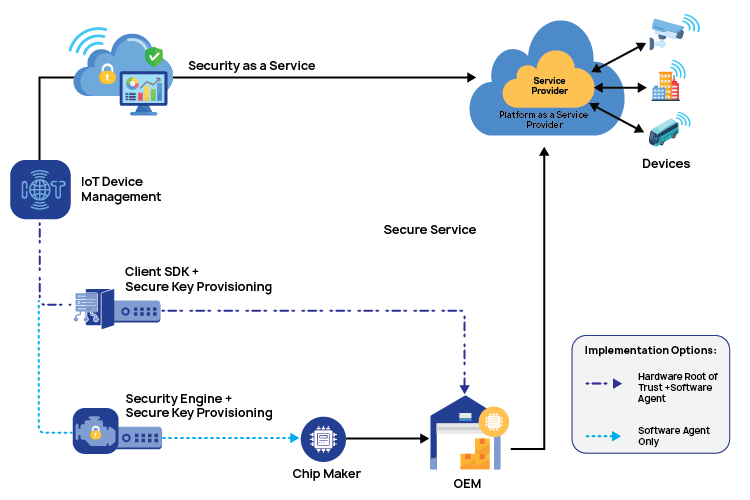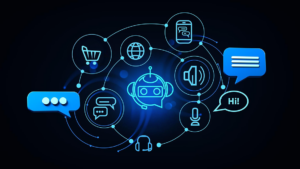

ACL Digital
5 Minutes read
Chip-to-Cloud: The Future of Secure and Scalable Digital Transformation
Businesses nowadays are hyper connected and they must have reliable security as they are using IoT, AI and Cloud computing for their day to day operations. Chip-to-cloud technology is one of the structured approaches that enables seamless cloud-based management by just embedding security at the hardware level.
Understanding the role of chip-to-cloud technology for secure and scalable digital transformation is essential and most importantly how it is reshaping various industries.
What is Chip-to-Cloud Technology?
As per the definition, Chip-to-cloud technology is a connection between a secure hardware and cloud-based intelligence. It encrypts data transfers, safer device setup, and also enables real-time monitoring, building a reliable and accessible system for connected devices. It ensures safe device setup, encrypts data transfers, and enables real-time monitoring, creating a reliable and scalable system for connected devices, also enables:
- Secure device authentication and provisioning
- Encrypted data transmission
- Real-time threat monitoring
- Automated compliance enforcement
- Scalable device and data management
By embedding security directly into hardware and extending it to cloud applications, businesses can build robust, future-ready systems.
Key Components of Chip-to-cloud
- Secure Hardware (Chip Level): To safeguard devices from unauthorized access embedded security features are essential such as secure boot, cryptographic keys, and reliable execution environments (TEE).
- Edge Processing: Devices equipped with Artificial Intelligence/Machine Learning abilities process data at the edge, decreasing latency and improving productivity.
- Cloud Connectivity: Protected data transmission to cloud platforms allows real-time analytics, unified device management, and automated workflows.
- Remote Monitoring and Updates: Cloud-based platforms provide continuous monitoring, firmware updates, and anomaly detection to ensure device security and performance.

Chip-to-cloud security model
Before connecting to the cloud, devices must establish a secure foundation at the hardware level. Security features such as tamper-resistant chips, cryptographic key storage, and hardware-based authentication ensure that only verified devices can interact with cloud systems. By embedding security directly into the hardware, organizations mitigate risks such as device spoofing, unauthorized data access, and firmware manipulation.
How Hardware Security and Cloud
Security isn’t just about protecting devices or locking down cloud access—it’s about making everything work as one. By combining secure hardware with smart cloud systems, businesses can spot risks early and stop them before they become bigger problems. Cloud platforms constantly check data from connected devices, helping teams detect issues and fix them before hackers can take advantage.
- End-to-End Encryption: Keeps data safe from the chip to the cloud.
- Strict Access Controls: Only approved users and devices can connect.
- AI-Powered Threat Detection: Finds unusual activity and stops threats early.
- Automated Compliance: Helps businesses meet security regulations without extra manual work.
Bringing hardware security and cloud intelligence together makes systems safer, improves efficiency, and helps businesses scale with confidence. It’s a key part of AI, IoT, and edge computing today
Why Businesses Are Turning to Chip-to-Cloud Technology
Technology is growing very quickly, and enterprises must have enhanced techniques to keep their data safe and secure every time. As AI, IoT, and cloud computing evolving every day, businesses are looking for ways that help them upgrade while protecting from cyber threats. That is where chip-to-cloud comes in.
The core idea of this approach is to have security of the hardware itself instead of relying only on software-based security. That clearly means encryption, identification of verification, and security of boot are erected directly into hardware devices, making them much tougher to even hack.
Scalability is a huge advantage, beyond security. Businesses do not have to worry about outgrowing their systems – cloud processing keeps everything running smooth, whether they are managing thousands of connected devices or training AI models for further enhancements.
As the data is processed in real-time, enterprises do not need to wait for the insights, because speed is the biggest advantage of the
Speed is another big benefit. Since data is processed in real time, companies don’t have to wait around for insights. This is especially valuable in industries like healthcare and finance, where fast decision-making can have a major impact.
Then there’s efficiency. With remote management, IT teams can handle updates, security patches, and troubleshooting without needing to be on-site. Predictive analytics also help spot potential issues early, preventing downtime and saving costs.
Cybersecurity is stronger, too. AI-powered threat detection constantly looks for unusual activity and shuts down risks before they become serious problems. And with automated compliance enforcement, businesses can meet security standards without the usual hassle.
In short, chip-to-cloud technology helps companies work smarter, move faster, and stay secure. That’s why more businesses are making the switch.
Industry Impact: Where Chip-to-Cloud is Transforming Business
Chip-to-cloud technology is driving fundamental changes across multiple industries, ensuring security, scalability, and real-time intelligence for modern business operations. By integrating hardware security with cloud-based intelligence, organizations can enhance efficiency, reduce risks, and unlock new opportunities for innovation.
- Semiconductor: The semiconductor industry leverages chip-to-cloud security to protect IP, ensure secure manufacturing processes, and enable real-time monitoring of chip performance in diverse applications.
- Consumer Electronics: From smart home devices to wearable technology, chip-to-cloud ensures data privacy, seamless software updates, and secure user authentication, enhancing both convenience and cybersecurity.
- Retail: Chip-to-cloud technology enhances supply chain security, prevents fraud in digital payments, and enables personalized shopping experiences through secure IoT-enabled smart shelves and POS systems.
- Healthcare: Medical devices and patient monitoring systems benefit from chip-to-cloud integration by ensuring secure data transmission, real-time analytics, and compliance with healthcare regulations. This enhances telemedicine, remote diagnostics, and overall patient care.
- Industrial IoT: Smart factories and industrial automation depend on chip-to-cloud frameworks to enable predictive maintenance, secure device connectivity, and real-time process optimization. This enhances operational efficiency while minimizing downtime and security risks.
- Automotive: Connected vehicles rely on chip-to-cloud security for real-time diagnostics, over-the-air updates, and AI-driven driver assistance systems. Secure communication between vehicle sensors and cloud platforms enhances safety, optimizes performance, and protects against cyber threats.
As enterprises embrace AI, IoT, and edge computing, chip-to-cloud technology will play a pivotal role in enabling secure, scalable, and intelligent ecosystems. By leveraging this approach, businesses can ensure data integrity, operational efficiency, and continuous innovation in an increasingly digital world.
How ACL Digital Accelerates Chip-to-Cloud Adoption
By adding AI-driven cloud computing, secure semiconductor design, and edge-to-cloud connectivity, ACL Digital enables enterprises to adopt chip-to-cloud technology. Seamless communication between hardware and cloud platforms can be ensured, enhancing security, operational efficiency, and scalability with a comprehensive approach.
ACL Digital helps businesses achieve real-time threat detection, automated compliance implementation, and enhanced performance across various industries by just embedding security at the chip level and extending it through cloud-based analytics. Its expertise in AI, IoT, Embedded Engineering, and Cloud infrastructure accelerates innovation while taking care of regulatory compliance and robust cybersecurity frameworks. For more details get in touch with our experts at business@acldigital.com.



